O’ gather ’round your screen of choice
For a new ILTBTA email and post.
We doth heard yon readers’ loudly voice:
“Thou art the nerds we love the most!”
And thus today e’er end of July,
We write anew on Shakespeare in Love.
Will lovers kiss and let sparks fly?
Or give conventions a clever shove?
There’s Gwyneth Paltrow and Joseph Fiennes
And other players of name enormity
Reciting The Bard’s most famous lines
Of true romance (and gender nonconformity).
So grab popcorn and a creative mindset
For the conclusion of “Romeo and July-et.”
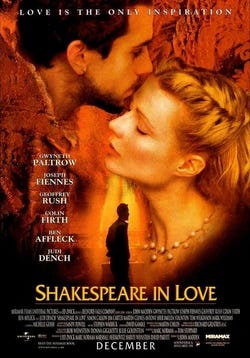
Previews
What, if anything, did we know about this coming attraction before we watched it?
Ellen: I remember this being a fun, romantic romp that had me laughing more than I expected.
Tyler: I watched this by myself so it must’ve been while you were on console and I needed to catch up to you. Here’s what I wrote in The Spreadsheet: “Feels like a dream movie for every theatre kid so it didn't exactly hit for me, though the plot is admittedly creative; somehow Gwyneth Paltrow's fake facial hair isn't the worst in the movie.”
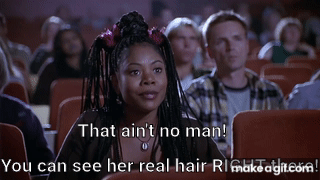
Plots & Feelings
This one’s pretty self-explanatory.
Short Version (courtesy of IMDb): The world's greatest ever playwright, William Shakespeare, is young, out of ideas and short of cash, but meets his ideal woman and is inspired to write one of his most famous plays.
Long Version (modified from Wikipedia and formatted to fit your screen):
Philip Henslowe is in a pickle. He owes a ruthless moneylender named Fennyman a lot of money, his theatre (The Rose) has been closed by Master of the Revels Edmund Tilney due to plague, and his only hope is in the suddenly muse-less William Shakespeare. Will is supposed to be writing a comedy called Romeo and Ethel, the Pirate’s Daughter, but he’s more concerned with competing with his rival Christopher Marlowe, getting some extra coin from Henslowe’s rival Burbage (whose theatre is The Curtain), and pretending he doesn’t have a family in Stratford-upon-Avon. Will pins all his hopes on Rosaline, but unfortunately for him, she’s also being pinned by Tilney and Burbage!
Ellen: Will is running around, paying people here, double-selling pages to his play there, pretending to have work done everywhere, and I just did not expect any part of this movie to evoke Uncut Gems!
Tyler: At one point when Will admits he hasn’t done as much as promised, Henslowe tells him “Love and a bit with a dog, that's what they want" which might as well be the tagline of our relationship.
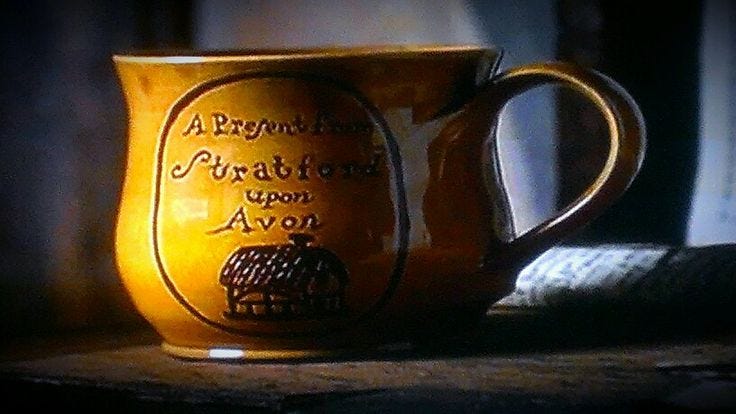
Meanwhile, Viola de Lesseps is a true theater kid: she goes to all the performances that Queen Elizabeth I has put on for her at court, mouthing along with her favorite Shakespeare lines. She is wealthy as the daughter of a merchant, but has no rank, and her father aims to change that by marrying her off to the unpleasant Lord Wessex1. She somehow hears that Henslowe is doing open auditions for Shakespeare’s as yet unwritten play, since his unusual troupe is out of town. Women are forbidden from acting, so she puts on a horrible wig, pretends to be a boy named Thomas Kent, and knocks Will’s eyeliner off in her audition! He wants to see “Thomas” closer, so Viola bolts. Her outfit is blue and Barney purple, however, so she’s easy to follow right up to the de Lesseps home. He gives a note to the nurse, asking Thomas to begin rehearsals.

Will’s not done with his merry chase just yet, however. Hearing there’s a party at the house, he poses as the hot tambourine player and is immediately gaga for Viola. Lord Wessex does not take their flirtatious dancing well and threatens him at knifepoint. Will claims to be Christopher Marlowe, and he heads right for
Juliet’sViola’s balcony. Their chemistry is palpable, interrupted only by her nurse! William flees, and he’s so excited by Viola that he stays up all night, writing new pages for his play with a decidedly more romantic flair.Tyler: I actually enjoyed the balcony scene getting truncated by the nurse, since it’s something that’s been portrayed a million times over before. By making it end prematurely, it allows Will to fantasize about a more idealistic version for his play.

The next day at rehearsal, the real actors return! Led by the arrogant yet charming2 Ned Alleyn, the Admiral’s Men and the others sink their teeth into the new script. Even our moneylender has become… invested! Will once again finds himself chasing Thomas to the de Lesseps home, only for the boatman to reveal what’s obvious to everyone else: Thomas = Viola! He sneaks into the house, and it’s all professions of love and taking off clothes. Both make a joke about being unfamiliar with taking off a man’s clothing, throwing cold water on Will’s whole “chaotic bisexual” vibe. And shout out to the nurse, who hears what’s going on and covers for the young couple.
Ellen: The boatman’s actual words are that the disguise “wouldn’t deceive a child,” which seems like the script acknowledging how terrible the disguise is.
Tyler: 100%, that plus it knocks “high society” down a peg.
Tyler: Also, can we talk about Ben Affleck? He felt like such a weird casting choice at first, but he somehow pulls this off pretty well!
Ellen: It’s so out of place but then it just clicks in - lest we forget: Ben knows what he’s doing!

Rehearsals continue, as does Viola and Will’s tryst, including some fun scenes of them romantically reading lines together with the parts reversed. Unfortunately, Viola’s engagement to Lord Wessex is also proceeding (“You will like Virginia” he says), as they’re summoned to receive the queen’s approval. Will tags along in nurse-based-drag, a fun inversion of Viola’s gambit. Elizabeth establishes herself as the queen of one-liners but gives her reluctant blessing. She also declares she’ll be the judge of a wager Will anonymously baits Wessex into: £50 on if a play can capture the true meaning of love.
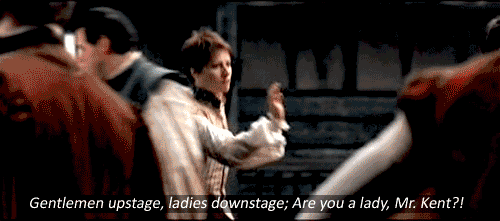
Hey so remember how there’s The Rose theatre and then their rival, The Curtain, and it’s run by Burbage, and he bought a play from Shakespeare at the beginning of the movie? Well, he’s come to collect! An actor brawl ensues, but our idiots are victorious! They go to a pub to celebrate, and Viola is thrilled to be in such a den of iniquity and bawdy camaraderie. Unfortunately, this is a Best Picture nominee, so we can’t just have a nice night. Henslowe lets slip that Will has an estranged wife, and even worse: Christopher Marlowe has been killed!
Will blames himself, assuming Wessex killed Marlowe, and he spends all night dramatically begging God for forgiveness. Wessex inadvertently crosses Viola’s wires, and she becomes despondent, believing Will to be dead! They solve it pretty quickly, all told, and Will and Viola celebrate with some life-affirming lovemaking at the theatre. This time a rat-loving kid sees them and tells! Wessex bursts into the theatre to try to kill Will, and the fight has none of the playful edge the first one did. In the course of the battle, Wessex and Ned, weirdly, confirm that Marlowe was actually killed in a simple bar fight. Tilney arrives to shut the whole thing down, exposing Viola’s illegal acting and her affair. The Rose is closed.

Burbage offers his theatre for the production, with Will replacing Viola as Romeo. And, what’s this? The young boy who’s supposed to play Juliet’s voice is suddenly deepening! Meanwhile, Viola and Wessex are married in an opulent but loveless ceremony. Outside the church, she sees a flier for the performance and sneaks away. She overhears Henslowe saying that they have no Juliet, and she reveals herself, assuring him she can play the role.
Will is Romeo, Viola is Juliet, and the crowd is absolutely enthralled. Wessex finds his way into the audience, fuming as he watches his wife onstage. After the dramatic conclusion, in which the audience is stunned to silence before breaking into applause3, Tilney bursts in to arrest everyone. They’re saved by a surprise Queen! Elizabeth covers for Viola, but orders her to sail with Wessex to Virginia. She also makes Wessex cough up the £50 for the previous wager and conscripts Will to write her something “a little more cheerful” for Twelfth Night.
Tyler: This seemed like a bit of a missed opportunity to have the leads finally do some famous R&J lines as the correct/intended gender roles, but I understand they had the entire play to skim through.

Viola and Will say their goodbyes, and he vows to immortalize her, as he imagines the beginning of Twelfth Night4, in character as a castaway disguised as a man after a voyage to a strange land.
Ellen: Viola assures Will it’ll be okay, and he asks how, and she says “it’s a mystery.” This is the 3rd time they use this line, and I don’t understand. It’s not good enough to merit Rule of Three treatment on its own, so is it a reference to something?? Dear Reader, please help me.
Intermission
Even though ILTBTA is free, please indulge us further and enjoy this quick “advertisement.”
This installment of ILTBTA is brought to you by … Virginia!
Looking for a colony to run off to with your newfound wealth (oh and the pesky bride that accompanies it)? Look no further than Virginia! Don’t worry about the fact that when this movie takes place Virginia technically doesn’t exist yet. Focus on our wide open fields with which to plant acres of tobacco, beautiful beaches, and friendly natives. Some of them even have lovely singing voices!

Use promo code ILTBTA when booking passage to Virginia and the colony’s tourism board will give you 100 acres of land. Surely no one’s using it now …
As Tyler told Ellen before they moved from Houston: “You will like Virginia.”
Wiki-Wiki-Whaaat?
Love a good Wikipedia rabbit hole in search of some fun facts? Us too.
Shakespeare in Love’s Wikipedia page has some interesting facts and anecdotes that we recommend you read through, but here are a few of our favorites:
Shakespeare in Love was directed by stage, film, television, and radio director John Madden, who was nominated for the Oscar for Best Director for his efforts (he lost to Steven Spielberg for Saving Private Ryan). He reunited with his Shakespeare in Love actors several times in his following movies: Gwyneth Paltrow in Proof, Tom Wilkinson in The Debt, Dame Judi Dench in The Best Exotic Marigold Hotel and The Second Best Exotic Marigold Hotel, and Colin Firth in Operation Mincemeat.
Speaking of some of these actors and actresses, let’s do a quick round of That Guy From That Thing and see if we can’t make you go “That’s where I know them from!”:
Joseph Fiennes (Will Shakespeare), whose full name is Joseph Alberic Twisleton-Wykeham-Fiennes, is perhaps best known now for his recent work as Commander Fred Waterford in The Handmaid’s Tale. He’s also the brother of fellow accomplished actor Ralph Fiennes.
If you’re anything like us, you recognized Geoffrey Rush (Rose Theatre owner Philip Henslowe) from his role as Captain Barbossa in the Pirates of the Caribbean series.
While we first met Simon Callow (Edmund Tilney) in A Room With A View, you may also remember him from his roles in Four Weddings and a Funeral (Gareth) or the recent TV shows Hawkeye (Armand Duquesne III) and The Witcher (Codringher).
Loyal ILTBTA readers will remember Tom Wilkinson (moneyman Hugh Fennyman) from Michael Clayton and The Full Monty, or his role as Carmine Falcone in Batman Begins or Benjamin Franklin in the John Adams miniseries.
Jim Carter (Ralph Bashford, the actor who plays Juliet’s nurse) is best known for his role as Mr. Carson on Downton Abbey. He is also married to …
Imelda Staunton (Viola’s nurse) is a wildly accomplished theatre actress, but is instantly recognized in our house as Dolores Umbridge in the Harry Potter films and Queen Elizabeth II from the last two seasons of The Crown. Speaking of Harry Potter …
Mark Williams (the stuttering Wabash) played Arthur Weasley in seven Harry Potter movies, in addition to Horace in the 1996 live action remake of 101 Dalmatians.

The original concept for Shakespeare in Love was actually first suggested to screenwriter Marc Norman in the late 1980s by his son Zachary. Norman was also the screenwriter of The Aviator, but not The Aviator I thought when I began writing this sentence.
Norman’s screenplay was then presented to director Edward Zwick and attracted the attention of Julia Roberts, who signed on to play Viola. Even though production had already started on the film, the role of Shakespeare hadn’t been cast because Roberts insisted that Daniel Day-Lewis (who was not interested) was the only one who could play the part. After failing to convince DDL, Roberts withdrew from the film, just six weeks before filming was set to begin. Zwick and the studio (Universal) desperately held chemistry tests between Roberts and several actors (including Hugh Grant, Ralph Fiennes, Colin Firth, and Sean Bean), but Roberts apparently either skipped the meetings or found faults with all of them. Universal ended up canceling the film altogether, costing them $6 million.
After Zwick convinced Miramax Films to take on the film instead (and after they subsequently replaced him), Miramax head and certified horrible person Harvey Weinstein led an aggressive (and controversial) Oscars campaign. This only gained more attention after Shakespeare in Love won Best Picture over favorite Saving Private Ryan and Gwyneth Paltrow beat frontrunner Cate Blanchett (Elizabeth) for Best Actress. Shakespeare in Love also won Oscars for Best Supporting Actress (Judi Dench), Best Original Screenplay, Best Art Direction, Best Costume Design, and Best Original Score.
Tyler: If you’re interested in digging even deeper into the drama of the making and promoting of this movie, check out a piece Zwick wrote last year on the inside story from his perspective.
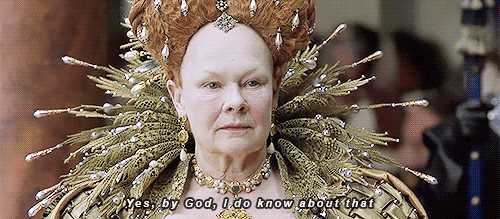
Among other actresses considered for Viola were Kate Winslet, Winona Ryder, Diane Lane, and Robin Wright.
The child who plays with rats and (pun intended) rats out Viola is named John Webster, a reference to the real life playwright John Webster, whose career overlapped with Shakespeare. Webster’s plays were known for their blood and gore, which is referred to in Shakespeare in Love when Webster (the child) says he “liked it when she stabbed herself.” Similarly, the waterman who ferries Shakespeare to Viola’s estate and tries to share his writing is a reference to English poet John Taylor, who began his career in London as a waterman.
Fill In The Blank
How did we really feel about The Academy nominating this?
Ellen: I’d like to give The Academy top billing in my upcoming comedy “tragedie.” This is funny, romantic, and engrossing! I’ll stay out of the debate about whether this should have beaten Saving Private Ryan, but I think it definitely deserved the nomination. It tended to be a little melodramatic at times (William simply cannot help himself), but even the bits where they were acting out Romeo & Juliet for the crowd seemed fresh and full of life.
My only gripe is the plethora of nods to specifics that end up in the play existing in William’s “real” life (i.e., “a plague on both [play]houses”, getting the Verona setting from Marlowe, mirroring his courtship with Viola). They can be quite fun, but in some ways just make it seem like he’s simply writing what happens to him and undercutting the vision of him as a literary genius. It’s humanizing, and surely the man himself didn’t invent everything whole cloth, but for it to happen over and over is somewhat too cute by half, taking the implication a touch too far beyond the film’s point. Maybe. Idk, it’s a mystery!
Tyler: I’d like to contribute a small donation to The Academy’s GoFundMe to save The Rose. Upon second rewatch, I think I both liked and appreciated this more. It’s a clever (if occasionally over-cute, as you mention) concept that is executed well with a great script that manages to freshen up a well-known story. It seems like the kind of movie that includes references and Easter eggs for normies and Shakespeare heads alike, similar to how I felt about last year’s Dungeons & Dragons: Honor Among Thieves, which we both greatly enjoyed. And the ending has shades of La La Land, in which it has the cajones to forgo the traditional happy ending for one that's more realistic with the main characters technically better off without each other despite having learned and experienced a lot.
Let The Credits Roll
Thanks for reading! Some quick housekeeping as you exit the theatre:
If you have plots and feelings of your own (on the movie or ILTBTA in general), feel free to comment on the post or simply reply to the email. If you liked reading this: tell your friends! If you hated reading this: tell your friends how much you hated it by forwarding it to them!
If you’re a weirdo like Tyler and use the social media site formerly known as Twitter, feel free to follow us there @BlankTheAcademy for ILTBTA updates, rejected jokes, and other random movie-related musings. Once we reach a million followers, we’ll offer to purchase the @ILTBTA handle from the butthead who snagged it before us.
ILTBTA is also on Letterboxd, the social networking site for movie fans. Follow us there to read our Spreadsheet comments of our ILTBTA movies, plus our ratings of other movies we watch!
If you’d like to start a wild Best Picture journey of your own, feel free to download a copy of The Spreadsheet. Bonus: checking off the boxes is oddly satisfying.
Post-Credits Scene
Get a sneak peek at the next ILTBTA installment.
The long, self-induced fever dream that was Romeo and July-et is finally over! If you’ve made it this far: congratulations! It’s time to reward yourself by celebrating the beginning of the Paris Olympics with The French Connection. Starring Gene Hackman and Roy Scheider as NYPD detectives chasing a wealthy French heroin smuggler, The French Connection is available to stream for free with a Max subscription and can be rented everywhere else. It’s considered by some to be one of the greatest films ever and clocks in at less than two hours, so it should be worth the rental fee!
Until then, here’s to you!

If you saw Poor Things, think of a more comical version of Bella’s husband. If you didn’t see Poor Things, feel free to keep it that way.
Sounds like my ex-wife!
Tyler: Me after watching Parasite.
Fun fact: the DCOM Motocrossed and Amanda Bynes classic She’s The Man are both (loose) adaptations of Twelfth Night!




